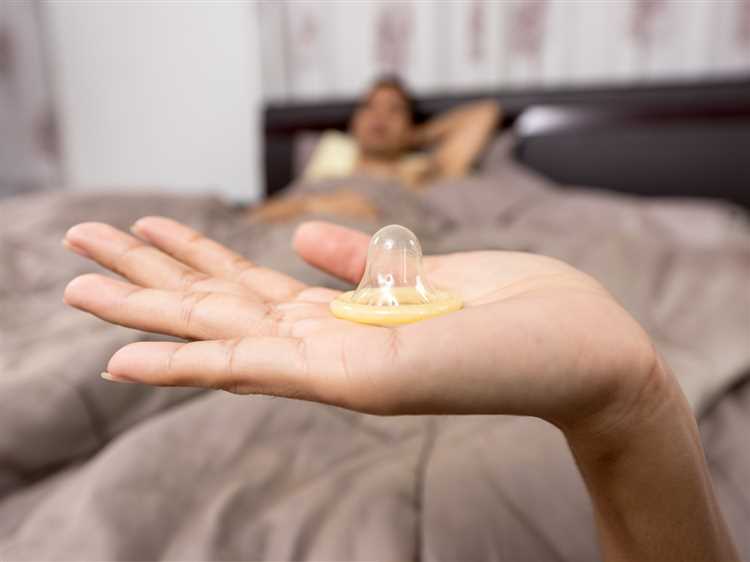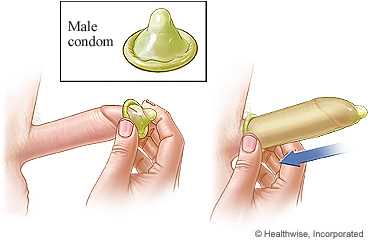
Male condoms have long been a popular choice for contraception, and for good reason. When used correctly and consistently, they are highly effective at preventing pregnancy. However, it’s important to separate fact from fiction when it comes to this form of birth control.
Firstly, let’s address some common misconceptions. Some people believe that male condoms are not a reliable form of contraception. This couldn’t be further from the truth. When used properly, they have a failure rate of only about 2%, making them one of the most effective methods available.
Another misconception is that male condoms are uncomfortable or decrease sexual pleasure. While it’s true that some men may initially find them unfamiliar or restrictive, many couples report that they quickly get used to the sensation and find that it doesn’t interfere with their enjoyment of sex.
So, how exactly do male condoms prevent pregnancy? They create a barrier between the penis and the vagina, preventing sperm from entering the woman’s reproductive system. Additionally, condoms are designed to catch and hold the ejaculate, further reducing the risk of pregnancy.
In conclusion, male condoms are a safe and effective method of contraception when used correctly. By debunking common myths and understanding how they work, couples can feel confident in their choice to use this form of birth control.
- Understanding Male Condoms
- How do male condoms work?
- Advantages of male condoms
- Importance of using male condoms
- 1. Preventing unintended pregnancies
- 2. Protecting against sexually transmitted infections
- 3. Safe, affordable, and easily accessible
- How male condoms work
- Physical barrier
- Ejaculation and semen collection
- Effectiveness and proper use
- Effectiveness of Male Condoms
- Can male condoms prevent pregnancy?
- Factors affecting the effectiveness of male condoms
- 1. Correct usage
- 2. Condom breakage or slippage
- 3. Concurrent use of other contraceptives
- 4. Latex allergies
- Benefits and Limitations of Male Condoms
- Benefits of using male condoms
- Q&A:
- How effective are male condoms at preventing pregnancy?
- Can male condoms completely protect against sexually transmitted infections?
- How should I properly use a male condom?
- Are there any side effects of using male condoms?
- Where can I get male condoms?
- Do male condoms prevent pregnancy?
Understanding Male Condoms
Male condoms are one of the most popular forms of contraception used to prevent pregnancy. They are a barrier method of birth control that is worn over the penis during sexual intercourse.
A male condom is made of a thin, stretchable material, usually latex or polyurethane, that is designed to cover the penis and prevent sperm from entering the vagina. When used correctly, male condoms are highly effective at preventing pregnancy, as well as reducing the risk of sexually transmitted infections.
How do male condoms work?

Male condoms work by creating a physical barrier between the penis and the vagina, preventing sperm from entering the woman’s reproductive system. This barrier also helps to reduce the risk of sexually transmitted infections by preventing contact between bodily fluids.
When a male condom is used correctly, it is unrolled onto an erect penis before any genital contact occurs. This ensures that the condom is in place and ready to provide protection. After ejaculation, the condom is held at the base of the penis and carefully withdrawn to avoid spilling any semen.
Advantages of male condoms
There are several advantages to using male condoms as a method of contraception:
| Advantages | Explanation |
|---|---|
| Effectiveness | When used correctly, male condoms are highly effective at preventing pregnancy and reducing the risk of sexually transmitted infections. |
| Accessibility | Male condoms are widely available without a prescription and can be purchased in most drugstores and supermarkets. |
| Easy to use | Male condoms are easy to use and require no additional preparation or planning. |
| No hormonal side effects | Unlike hormonal methods of contraception, such as birth control pills, male condoms do not have any hormonal side effects. |
It is important to note that male condoms are not 100% effective and can break or slip off during intercourse. To maximize effectiveness, it is recommended to use a new condom for each act of intercourse and to store them in a cool, dry place.
Importance of using male condoms
Male condoms are an essential tool for preventing unintended pregnancy and protecting against sexually transmitted infections (STIs). They serve as a barrier method that prevents sperm from reaching the egg and also acts as a barrier against various STIs, including HIV.
1. Preventing unintended pregnancies
One of the primary benefits of using male condoms is their effectiveness in preventing unplanned pregnancies. When used correctly and consistently, male condoms offer a high level of protection against pregnancy. They provide a physical barrier that prevents semen from entering the vagina and reaching the cervix, thus reducing the risk of fertilization.
2. Protecting against sexually transmitted infections
In addition to preventing pregnancy, male condoms also play a crucial role in protecting against STIs. They act as a barrier, preventing the exchange of bodily fluids that can transmit infections such as HIV, gonorrhea, chlamydia, and syphilis. Male condoms provide a physical barrier between the penis and the vagina, reducing the risk of infection transmission during sexual intercourse.
It’s important to note that while condoms provide a high level of protection against most STIs, they may not offer complete protection against certain infections like herpes or human papillomavirus (HPV) that can be transmitted through skin-to-skin contact in areas not covered by the condom.
3. Safe, affordable, and easily accessible
Male condoms are widely available, affordable, and easy to use. They are accessible over-the-counter at various stores, pharmacies, and clinics. Condoms are a safe method of contraception without any serious side effects and can be used by most individuals, regardless of age or medical history. They can also be combined with other contraceptive methods for added protection.
- Condoms are easy to use and require no prescription.
- They can be carried discreetly and used on demand.
- Condoms have minimal side effects and do not affect hormone levels.
- They can be used by individuals with latex allergies by opting for latex-free alternatives.
Overall, using male condoms is an important aspect of sexual health and contraception. They not only provide effective protection against unintended pregnancies but also offer a crucial barrier against STIs. Incorporating condom use into sexual activities can help promote safer and healthier sexual relationships.
How male condoms work
Male condoms are a type of barrier contraceptive that can help prevent pregnancy and reduce the risk of sexually transmitted infections (STIs).
Physical barrier
The primary mechanism of action for male condoms is to create a physical barrier between the penis and the vagina, cervix, or rectum. The condom is a thin sheath typically made of latex, polyurethane, or polyisoprene that is rolled onto an erect penis before sexual intercourse.
This barrier prevents sperm from coming into contact with an egg, thus reducing the risk of fertilization and pregnancy. It also helps protect against the transmission of STIs by preventing direct contact between the sexual organs and bodily fluids.
Ejaculation and semen collection
In addition to acting as a physical barrier, male condoms also collect semen after ejaculation, preventing it from entering the partner’s body. This further reduces the risk of pregnancy and STI transmission.
After ejaculation, the condom should be held at the base of the penis to prevent it from slipping off. Care should be taken during removal to avoid any spilling or contact between the ejaculate and the partner’s body.
Effectiveness and proper use
The effectiveness of male condoms in preventing pregnancy depends on correct and consistent use. When used correctly, they have a high success rate in preventing both pregnancy and the transmission of STIs.
Proper use involves carefully opening the packet, unrolling the condom onto an erect penis, and ensuring it is secure and in place throughout sexual activity. Lubrication can be added to enhance comfort and reduce the risk of breakage.
It is important to note that male condoms should be used only once and should be disposed of properly after each use. Using expired condoms or reusing condoms increases the risk of breakage or failure.
- Use a new condom for each sexual encounter
- Store condoms in a cool, dry place away from direct sunlight
- Never use oil-based lubricants with latex condoms, as they can weaken the material
Overall, male condoms are a reliable and accessible contraceptive option that provide protection against unintended pregnancy and STIs when used consistently and correctly.
Effectiveness of Male Condoms
Male condoms are a widely used method of contraception that can help prevent pregnancy. When used correctly and consistently, they are highly effective in preventing pregnancy and offering protection against sexually transmitted infections (STIs).
The effectiveness of male condoms in preventing pregnancy depends on various factors, including proper and consistent use. According to studies, condoms are approximately 98% effective when used correctly and consistently. However, this effectiveness rate may decrease if the condoms are not used correctly every time or if they break or slip off during sexual intercourse.
It is important to note that male condoms do not provide 100% protection against pregnancy and STIs. There is still a small risk of pregnancy even when condoms are used correctly. This is because condoms can sometimes break or slip off during intercourse, or they may not be used from the beginning to the end of sexual intercourse.
In addition to their contraceptive benefits, male condoms also offer protection against STIs like HIV, gonorrhea, chlamydia, and syphilis. However, they may not fully protect against STIs that are transmitted through contact with skin not covered by the condom, such as herpes and genital warts. To maximize protection against STIs, it is recommended to use condoms in conjunction with other prevention methods, such as regular testing and vaccination.
| Factors Affecting Condom Effectiveness | Effectiveness Rate |
|---|---|
| Consistent and correct use | Approximately 98% |
| Inconsistent or incorrect use | Lower effectiveness rate |
| Condom breakage or slippage | May result in pregnancy |
| STIs transmitted through skin not covered by the condom | Bacterial and viral STIs may still be transmitted |
In conclusion, male condoms are an effective method of contraception when used correctly and consistently. However, it is important to remember that no contraceptive method can provide 100% protection against pregnancy or STIs. For maximum protection, it is recommended to use condoms in combination with other preventive measures, such as regular STI testing and vaccination.
Can male condoms prevent pregnancy?

Yes, male condoms can effectively prevent pregnancy when used correctly. Condoms are a barrier method of contraception, which means they create a physical barrier between sperm and the cervix, preventing sperm from reaching and fertilizing an egg.
Male condoms are made of latex, polyurethane, or polyisoprene material, and they are designed to fit over the erect penis. When used consistently and correctly, condoms are estimated to be 98% effective at preventing pregnancy. However, the effectiveness can vary depending on various factors, such as the type of condom used, the presence of any defects, and the way it is used.
To ensure maximum effectiveness, it is essential to use a condom every time you engage in sexual intercourse, from start to finish. It is also crucial to use a new condom for each act of intercourse and to store them in a cool, dry place to avoid damage or deterioration.
Male condoms not only provide protection against pregnancy but also reduce the risk of sexually transmitted infections (STIs). They create a barrier that prevents both sperm and infectious agents, such as viruses and bacteria, from passing between partners.
It is important to note that while male condoms are highly effective, they are not foolproof. There is still a small chance of pregnancy or STI transmission even with correct and consistent condom use. To further enhance protection, it may be advisable to consider using another form of contraception, such as hormonal methods or intrauterine devices (IUDs), in conjunction with condoms.
Factors affecting the effectiveness of male condoms
Male condoms are a widely used method of contraception that offers protection against pregnancy and sexually transmitted infections (STIs). However, the effectiveness of male condoms can be influenced by various factors, including:
1. Correct usage
The effectiveness of male condoms in preventing pregnancy depends on their correct and consistent usage. It is important to carefully read and follow the instructions provided with the condom, including properly placing it on the erect penis before any sexual contact. Failure to use the condom correctly, such as not unrolling it all the way or using it after the expiration date, can reduce its effectiveness in preventing pregnancy.
2. Condom breakage or slippage
Male condoms can break or slip off during sexual intercourse, which can increase the risk of pregnancy. This may occur if the condom is not the right size or if there is not enough lubrication. Using extra lubrication can help reduce the risk of breakage and slippage. It is also important to choose condoms that are made of high-quality materials and have been properly stored to avoid any damage that could compromise their effectiveness.
3. Concurrent use of other contraceptives
The effectiveness of male condoms can also be affected by the concurrent use of other contraceptives. Using a male condom in combination with another form of contraception, such as hormonal methods or intrauterine devices (IUDs), can provide added protection against pregnancy. However, it is important to consult with a healthcare provider to ensure that the chosen combination of contraceptives is safe and effective.
4. Latex allergies
Some people may have latex allergies, which can cause irritation and discomfort when using latex condoms. In such cases, it is recommended to use non-latex condoms made of materials like polyurethane or polyisoprene. These alternative materials can be equally effective in preventing pregnancy and may be more suitable for individuals with latex allergies.
By considering these factors and using male condoms correctly and consistently, individuals can maximize their effectiveness in preventing pregnancy and reducing the risk of STIs.
Benefits and Limitations of Male Condoms

Benefits of Male Condoms:
Male condoms are an effective and convenient form of contraception that offer several benefits:
- Protection against unintended pregnancy: Male condoms are highly effective in preventing pregnancy when used correctly and consistently. They provide a barrier that prevents sperm from reaching the egg, reducing the risk of fertilization.
- Protection against sexually transmitted infections (STIs): Male condoms act as a protective barrier, reducing the risk of contracting or transmitting STIs, including HIV.
- Availability and accessibility: Male condoms are widely available and easily accessible. They can be purchased over the counter at drugstores, supermarkets, and other retail outlets, making them a convenient choice for many individuals.
- Non-hormonal method: Unlike hormonal methods of contraception, male condoms do not interfere with the body’s natural hormone levels. This makes them a suitable option for individuals who prefer non-hormonal contraception.
- Temporary and reversible: Male condoms are a reversible form of contraception, allowing individuals the flexibility to choose when to use them. They do not require any long-term commitment and can be discontinued at any time.
Limitations of Male Condoms:
While male condoms offer numerous benefits, they also have some limitations:
- Risk of breakage or slippage: In some cases, male condoms may break or slip off during intercourse, which can reduce their effectiveness. It is important to use condoms correctly, store them properly, and check for any signs of damage before use.
- Compatibility with oil-based products: Male condoms should not be used with oil-based lubricants, as they can weaken the latex and increase the risk of breakage. Water-based or silicone-based lubricants are recommended instead.
- Allergic reactions: Some individuals may be allergic to latex, which is the most common material used in male condoms. In such cases, alternative options like polyurethane or polyisoprene condoms can be used.
- Responsibility for correct usage: Male condoms require proper and consistent usage to be effective. It is important to correctly put on and remove the condom, as well as use a new condom for each sexual act. Any errors or inconsistencies can reduce their effectiveness.
- Decreased sensation: Some individuals may find that male condoms reduce sensitivity during intercourse. However, using extra lubrication or experimenting with different condom styles can help address this issue.
Overall, male condoms are a popular and highly effective method of contraception that offers numerous benefits. However, it is important to be aware of their limitations and use them correctly for optimal protection against pregnancy and STIs.
Benefits of using male condoms
There are several benefits of using male condoms as a method of contraception:
|
1. Highly effective: Male condoms have a high success rate in preventing pregnancy when used correctly. They provide a physical barrier that prevents sperm from reaching the egg, reducing the risk of unintended pregnancies. |
|
2. Protection against sexually transmitted infections (STIs): In addition to preventing pregnancy, male condoms are an effective method of protecting against sexually transmitted infections. They act as a barrier that reduces the risk of transmission of STIs, including HIV/AIDS, gonorrhea, chlamydia, syphilis, and herpes. |
|
3. Easy to use: Male condoms are widely available and easy to use. They do not require a prescription and can be easily purchased at pharmacies or obtained for free from healthcare providers. They can be used immediately without the need for any additional preparation. |
|
4. Non-hormonal: Male condoms do not contain hormones and do not interfere with the hormonal balance of the body. This makes them a suitable contraceptive option for individuals who cannot or do not wish to use hormonal methods of contraception. |
|
5. Reversible: Male condoms offer a reversible form of contraception. Unlike some other methods, such as sterilization or hormonal methods, condoms can be stopped at any time without any long-term effects on fertility. |
Q&A:
How effective are male condoms at preventing pregnancy?
Male condoms are about 98% effective at preventing pregnancy when used correctly. However, it is important to note that this effectiveness rate may decrease if the condom is not used properly or if it breaks.
Can male condoms completely protect against sexually transmitted infections?
While male condoms are effective in reducing the risk of sexually transmitted infections (STIs), they do not provide 100% protection. Some STIs, such as herpes and HPV, can still be transmitted through skin-to-skin contact that is not covered by the condom.
How should I properly use a male condom?
Using a male condom correctly involves a few steps. First, make sure the condom is in its package and carefully open it to avoid tearing. Then, pinch the reservoir tip of the condom and place it on the head of the erect penis. Roll the condom down to the base of the penis, making sure there are no air bubbles. After ejaculation, hold the condom at the base of the penis and withdraw while it is still erect. Dispose of the condom properly.
Are there any side effects of using male condoms?
Using male condoms does not generally cause any side effects. However, some individuals may be allergic to latex or the lubricant used on certain condoms, which can cause irritation or allergic reactions. Non-latex condoms are available for those with latex allergies.
Where can I get male condoms?
Male condoms are widely available and can be obtained from various sources. They can be purchased at drugstores, supermarkets, and convenience stores. They may also be available for free at family planning clinics, health centers, or through some schools and organizations.
Do male condoms prevent pregnancy?
Yes, male condoms are very effective at preventing pregnancy when used correctly and consistently. They create a barrier that prevents sperm from entering the vagina, thus reducing the chances of fertilization.